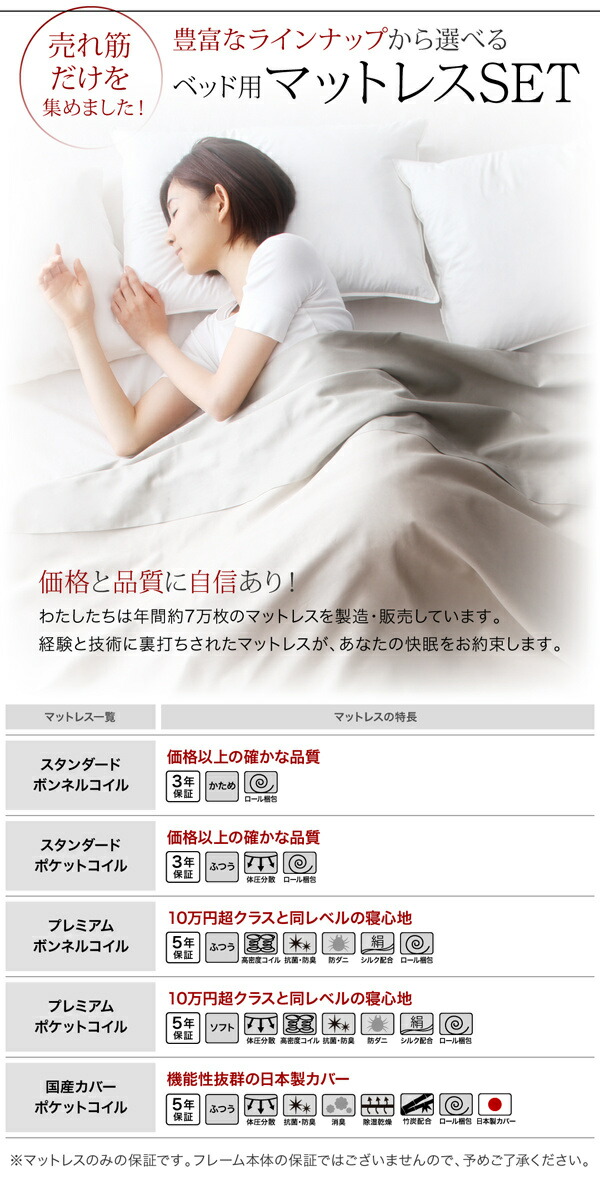- 当日発送
- 送料無料
棚・コンセント・収納付き大型モダンデザインベッド プレミアムポケットコイルマットレス付き ワイドK240(S+D) 組立設置付|ディアライフ 生活便利グッズの店 フレーム・マットレスセット 品質保証、最安値に挑戦!
- 販売価格 :
-
¥134,676税込
- 獲得ポイント :
- 344ポイント
当日発送可 (14:00までのご注文が対象)
- ※
ご注文内容・出荷状況によっては当日発送できない場合もございます。
詳しくはこちらよりご確認ください。
利用可
- ※
ポストにお届け / 一点のみ購入でご利用可能です。
ゆうパケットでのお届けの場合はサンプル・ノベルティが対象外となります。
ゆうパケットには破損・紛失の保証はございません。
詳しくはこちらよりご確認ください。
商品の詳細
ショップトップ > カテゴリトップ > その他
2023/11/25 更新

















































| ▼セットを選ぶ▼ |
ベッドフレームのみ
スタンダードボンネルコイルマットレス付き
スタンダードポケットコイルマットレス付き
プレミアムボンネルコイルマットレス付き
プレミアムポケットコイルマットレス付き (現在表示中)
マルチラススーパースプリングマットレス付き
ゼルトスプリングマットレス付き
羊毛入りゼルトスプリングマットレス付き
| ▼サイズを選ぶ▼ |
ワイドK200(S×2)
ワイドK220(S+SD)
ワイドK240(SD×2)
ワイドK240(S+D) (現在表示中)
ワイドK260(SD+D)
ワイドK280(D×2)
ワイドK300(S×3)
| ▼組立設置サービスを選ぶ▼ |
お客様組立
組立設置サービス付 (現在表示中)
ショップトップ > カテゴリトップ > その他
この商品を見た方がよく購入している商品
 棚・コンセント・収納付き大型モダンデザインベッ269,351円
棚・コンセント・収納付き大型モダンデザインベッ269,351円  棚・コンセント・収納付き大型モダンデザインベッ254,039円
棚・コンセント・収納付き大型モダンデザインベッ254,039円  棚・コンセント・収納付き大型モダンデザインベッ185,226円
棚・コンセント・収納付き大型モダンデザインベッ185,226円  棚・コンセント・収納付き大型モダンデザインベッ293,352円
棚・コンセント・収納付き大型モダンデザインベッ293,352円  棚・コンセント・収納付き大型モダンデザインベッ278,040円
棚・コンセント・収納付き大型モダンデザインベッ278,040円  棚・コンセント・収納付き大型モダンデザインベッ284,352円
棚・コンセント・収納付き大型モダンデザインベッ284,352円  棚・コンセント・収納付き大型モダンデザインベッ269,040円
棚・コンセント・収納付き大型モダンデザインベッ269,040円  棚・コンセント・収納付き大型モダンデザインベッ248,040円
棚・コンセント・収納付き大型モダンデザインベッ248,040円  棚・コンセント・収納付き大型モダンデザインベッ284,352円
棚・コンセント・収納付き大型モダンデザインベッ284,352円 新着商品はこちら 2023/11/24
 Deconovo 遮光カーテン 1級 ダイヤモ3,677円 2023/11/23
Deconovo 遮光カーテン 1級 ダイヤモ3,677円 2023/11/23 MR:レゴ レゴムービー ウルトラキャットと戦29,450円 2023/11/22
MR:レゴ レゴムービー ウルトラキャットと戦29,450円 2023/11/22 MR:XIAXIN 硬度計 A型 アナログ デ4,907円
MR:XIAXIN 硬度計 A型 アナログ デ4,907円 再販商品はこちら 2023/11/24
 MR:2組 NUZAMAS M20 RJ45防3,353円 2023/11/24
MR:2組 NUZAMAS M20 RJ45防3,353円 2023/11/24 MR:ホーザン 消磁器 磁気抜き スイッチを押11,574円 2023/11/24
MR:ホーザン 消磁器 磁気抜き スイッチを押11,574円 2023/11/24 MR:パナソニック フルカラー埋込トリプルコン1,791円
MR:パナソニック フルカラー埋込トリプルコン1,791円 商品の説明

連結ベッド クイーン ワイド 2人 3人 家族 つなげる 2台 分割 ファミリー 親子 マットレス付き 跳ね上げ式 ガス圧 ベッド下 収納 大容量 宮 ヘッドボード 枕元 棚 携帯 ティッシュ メガネ リモコン 頭上 照明 読書灯 ライト コンセント スマホ 充電 ホテル モダン 高級|WOODS(ウッズ)
![高級ウォルナット材ツインベッド Fidelio フィデリオ プレミアム国産ハードポケットコイルマットレス付き ツイン(S+SD)[C4][00]|家具・インテリア雑貨 カグール](https://tshop.r10s.jp/cagu-le/cabinet/c01/033/42/041462.jpg)
高級ウォルナット材ツインベッド Fidelio フィデリオ プレミアム国産ハードポケットコイルマットレス付き ツイン(S+SD)[C4][00]|家具・インテリア雑貨 カグール

送料無料 フレーム マットレス セット A+Bタイプ ワイドK240(SD×2) セミダブル×2台 コンパクト 国産 ファミリー 収納 連結ベッド Alonza アロンザ ベッド 跳ね上げ収納 引き出し 薄型抗菌国産ポケットコイルマットレス付き 大容量 家族 連結 おしゃれ|ベッド・家具通販furniture store

連結ベッド 幅280 キング ワイド 2人 3人 4人 家族 つなげる 2台 分割 ファミリー 親子 マットレス付き ローベッド ロータイプ フロア 低い 宮 棚 携帯 メガネ リモコン 収納 照明 読書灯 ライト コンセント スマホ 充電 布団可 すのこ 通気性 除湿 カビ 脚付き 足付 高級|家具・インテリア通販 アットカグ

送料無料 収納付きベッド ベッドフレーム マットレスセット キングベッド (SS×S) 2台 宮棚付き コンセント 国産 跳ね上げ収納ベッド Landelutz ランデルッツ 薄型抗菌国産ポケットコイルマットレス付き 大容量 木製 連結ベッド 家族 ファミリー|ナイススタイル
![【ポイント4倍】組立設置付 国産大型サイズ跳ね上げ収納ベッド Cervin セルヴァン 羊毛入りゼルトスプリングマットレス付き 縦開き ワイドK200[H4][00]|本家屋](https://tshop.r10s.jp/honkeya/cabinet/c01/033/38/037585.jpg)
【ポイント4倍】組立設置付 国産大型サイズ跳ね上げ収納ベッド Cervin セルヴァン 羊毛入りゼルトスプリングマットレス付き 縦開き ワイドK200[H4][00]|本家屋
![【お客様組立】跳ね上げ式ベッド キング(SS+S) [薄型抗菌国産ポケットコイルマットレス付き 縦開き キング(SS+S) 国産大型跳ね上げ収納ベッド Cervin セルヴァン]|コミットアンド店](https://tshop.r10s.jp/commit1/cabinet/c18/500040876/500040915.jpg)
【お客様組立】跳ね上げ式ベッド キング(SS+S) [薄型抗菌国産ポケットコイルマットレス付き 縦開き キング(SS+S) 国産大型跳ね上げ収納ベッド Cervin セルヴァン]|コミットアンド店

送料無料 組立サービス付き ベッドフレーム マットレス 縦開き ワイドK200(シングル×2台) 深さラージ モダン ライト 大型跳ね上げ収納ベッド Nataliya ナターリヤ ゼルトスプリングマットレス付き 棚付き コンセント付き 大容量 収納 ベット|ベッド・家具通販furniture store

お客様組立 大容量収納ファミリーチェストベッド TRACT トラクト 薄型プレミアムポケットコイルマットレス付き A+A ワイドK200 (S×2) Aタイプ(サイド引出し+フット引出し) 「大容量収納ベッド ファミリーベッド 国産フレーム 」|激安輸入雑貨店

お客様組立 壁付けできる国産ファミリー連結収納ベッド Tenerezza テネレッツァ マルチラススーパースプリングマットレス付き A+Bタイプ ワイドK240(SD×2)|激安輸入雑貨店
最新のクチコミ
小5と小2の娘に買いました。 髪の毛を結んで帽子の中に入れてもすっぽり頭が入っていい感じです。大きさもピッタリでした。
- dpz*****さん
- 55歳
- アトピー
- クチコミ投稿 2件
購入品
サイズ調整ができるようにスナップが2列付いているけど、スナップを外側(大きいほうのサイズ)にするとスナップとスナップの間がパカーっと開いてしまう。
- dot*****さん
- 65歳
- アトピー
- クチコミ投稿 2件
購入品
以前からプレミアムストレッチを愛用しており、今回は冬用として裏起毛を購入。生地も厚すぎずちょうどいい!冬はこれで乗り切ります。
- nhs*****さん
- 69歳
- アトピー
- クチコミ投稿 1件
購入品
生地は薄く糸がほつれているところもありました。値段相応かなと思います。
- zqw*****さん
- 25歳
- アトピー
- クチコミ投稿 4件
購入品
思っていたとおりのアイシャドウです。お届けありがとうございます。。。送料無料なのがいいと思いました。
- ytv*****さん
- 52歳
- アトピー
- クチコミ投稿 2件
購入品
日本製でとてもしっかりしています。完成品なのですぐ使えて大変気に入ってます。
- dfv*****さん
- 44歳
- アトピー
- クチコミ投稿 3件
購入品
安くて、よい商品です。テーブル面の色合いは、確かに少しピンクっぽいですが、私は気になりませんでした。ただ、どちらかというと・・・裏面の色のほうが好みでした・・・。マイナス点は、組説通りだとうまくは出来ないところです。微妙な調整作業を説明することは難しいとは思いますが、単純な順番作業だけではうまくいかない時のために、調整方法を記載しておいてほしかったです。その他を含めて、全体的には満足出来ています。
- wru*****さん
- 44歳
- アトピー
- クチコミ投稿 4件
購入品
これがなかったら家の猫は水が飲めません
- jiu*****さん
- 43歳
- アトピー
- クチコミ投稿 1件
購入品
スムーズに購入できました。我が家のねこも満足しているようです。健康食のものがあれば是非購入してみたいです。
- bwk*****さん
- 28歳
- アトピー
- クチコミ投稿 3件
購入品
食べ切りサイズで無駄にせず与えられています。食いつきもよくリピートしています。食べ戻しもなくなりました。この雰囲気のもので主食として与えられるものが出てくれるとありがたいです。
- jhs*****さん
- 52歳
- アトピー
- クチコミ投稿 2件
購入品
12歳のメス猫の食欲が落ちてきて、色々なご飯を試したいと思い購入しました。ちなみに、これまで一番食いつきが良いのはシーバです。でも、シーバっておやつ的なものなので、あまり多く与えたくないんですよね。こちらの詰め合わせは、どれもお高めなものばかりです。高いものは、購入してもし食べなかった場合、もったいないので、このような詰め合わせは良いと思います。与えてみた結果はというと、どれもイマイチでした。これは味が悪いというわけではなく、うちの猫には合わなかっただけかと思います。わかったのは、高ければ美味しいというわけではないということ。
- yrh*****さん
- 61歳
- アトピー
- クチコミ投稿 5件
購入品
普段はMサイズを着ていますが胸が大きめなので、Lサイズを買いました。伸縮性があるので、ちょうどよかったです。
- iyu*****さん
- 38歳
- アトピー
- クチコミ投稿 4件
購入品
子どもが天体に興味を持ち始めたので購入してみました。望遠鏡のメーカーと倍率、そして手頃な値段でこちらを購入。子どもがとても喜んでいるので良かったです!
- rgw*****さん
- 37歳
- アトピー
- クチコミ投稿 3件
購入品
フレーム・マットレスセットのデイリーランキング
この商品を見ている人におすすめ
-
-

その他
¥14,600
-

化粧水・ローション
¥5,281
-

ブレーキパッド
¥11,190
-

コスチューム・コスプレ
¥9,892
-

フロント
¥29,091
-



















